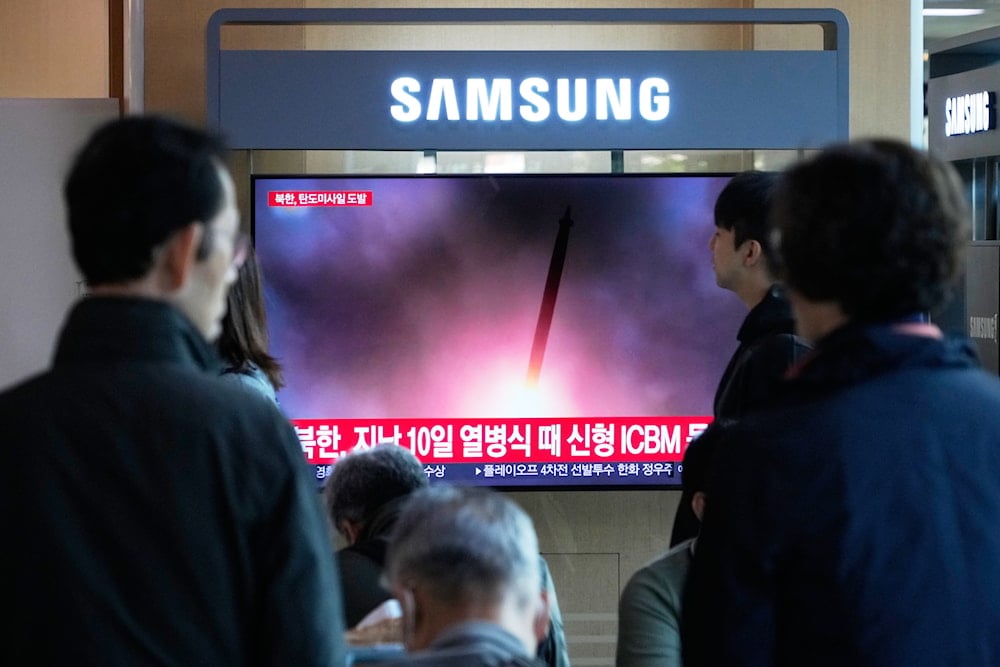DPRK warns of 'nuclear domino' over UK-South Korea submarine deal
DPRK condemns the South Korea-US plan for nuclear submarines, warning of a "nuclear domino" and regional arms race amid heightened military tensions.
-

A TV screen shows a file image of the Democratic People's Republic of Korea's missile launch during a news program at Seoul Railway Station in Seoul, South Korea, Wednesday, Oct. 22, 2025 (AP)
The Democratic Republic of Korea said on Tuesday that South Korea's US-approved plan to construct nuclear-powered submarines would trigger a "nuclear domino" effect.
On November 14, South Korea and the US jointly released the details of the agreement struck by President Lee Jae Myung and President Donald Trump at their summit last month, which included a commitment to disarm the DPRK's nuclear arsenal and a plan to build nuclear submarines jointly.
The agreement revealed the "true colours of the confrontational will of the US and the ROK to remain hostile towards the DPRK," the state news agency KCNA reported, noting that this pledge, along with a series of large-scale joint military drills by the two countries, posed grave challenges to the DPRK's security and aggravated regional tensions.
Interest or diktat?
It accused Seoul of secretly advancing a long-cherished ambition to possess nuclear weapons, an action it stated is bound to set off a "nuclear domino" phenomenon in the region and spark a dangerous arms race.
South Korea's Lee said earlier that the submarines were critical to maintaining readiness against China's naval forces and the potentially grave threat from the nuclear-armed Democratic Republic of Korea's push to develop its own nuclear-powered submarines.
South Korean presidential office spokesperson Kang Yu-jung said later on Tuesday that Seoul has no hostile or confrontational intent against the Democratic People's Republic of Korea and that its cooperation with the US was intended solely to protect its own national security interests.
South Korea proposes talks with DPRK
On November 17, the South Korean Defense Ministry said that South Korea has proposed holding military talks with the DPRK to reduce tensions along their shared border and clarify the military demarcation line, following a series of alleged violations by Democratic People's Republic of Korea troops in the demilitarized zone.
In an official statement, the South Korean armed forces urged Pyongyang to engage in inter-Korean military dialogue to prevent accidental clashes and ease tensions near the DMZ.
The Defense Ministry stated, "Our armed forces officially propose holding talks between North and South Korean military departments to prevent accidental clashes and reduce military tension, as well as to discuss the establishment of a reference line for the military demarcation line."
The Ministry suggested that the meeting could take place at the Panmunjom border crossing with the date and time open for discussion, while emphasizing the urgency of a prompt response from Pyongyang to help restore trust and improve stability on the Korean Peninsula, with the proposed talks also aiming to revive channels of communication that have eroded since the partial suspension of a key inter-Korean military agreement.
Tensions rise between the two Koreas
In 2024, the Democratic People's Republic of Korea (DPRK) intensified its weapons testing, including the launch of the Hwasong-19 solid-fuel intercontinental ballistic missile.
The missile flew for over 80 minutes and reached record altitudes, signalling a major leap in Pyongyang’s long-range strike capabilities. Earlier that year, the DPRK had also tested a new hypersonic intermediate-range ballistic missile, the Hwasong-16B.
These tests coincided with large-scale US-South Korea joint military drills, such as Hoguk and Ulchi Freedom Shield, which Pyongyang denounced as rehearsals for invasion.
Kim Yo Jong, Member of DPRK State Affairs Commission, warned that continued trilateral military coordination between the US, South Korea, and Japan would trigger “unfavourable consequences,” framing them as direct threats to DPRK sovereignty.

 4 Min Read
4 Min Read










